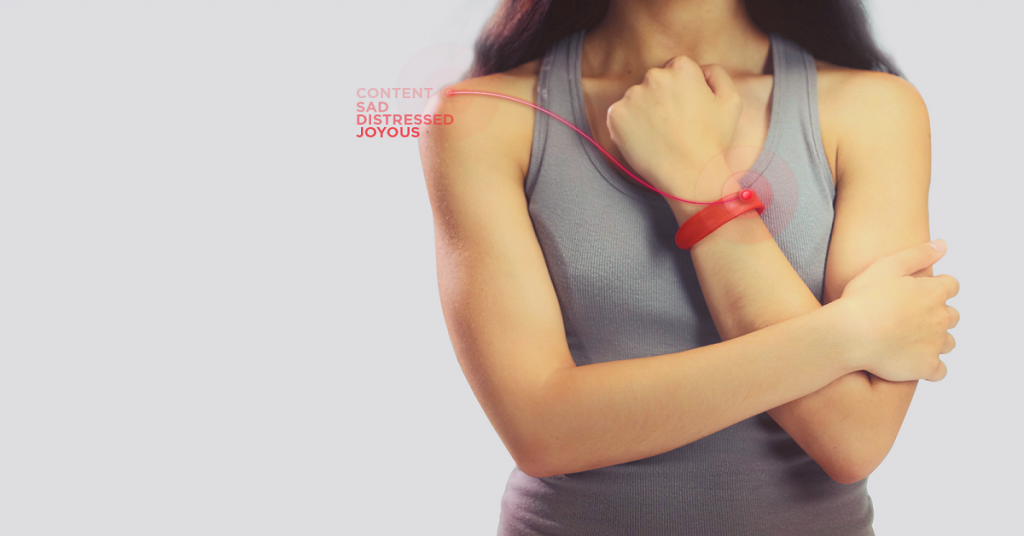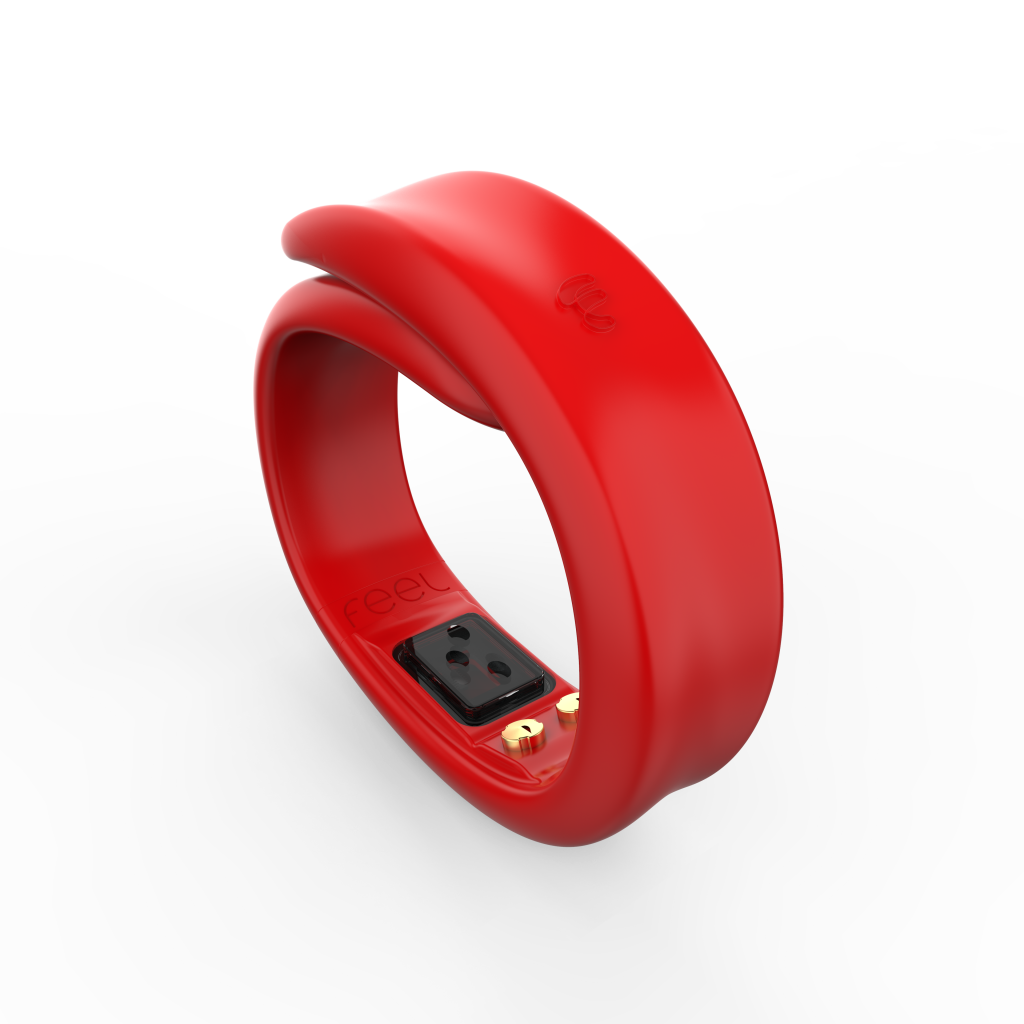MyFeel – Investing feelings into a better future
Have you noticed how when you feel angry, your heart starts beating faster, or when you are stressed, you might begin to sweat? This happens because several body signals are strongly correlated with your emotional status, says Elsa Katsorida, Associate Project Manager in Sentio Labs.
The innovation-driven team within the entire euPOLIS philosophy aims to improve the quality of our lives: how good is the air we breathe, is it safe to drink the tap water, are we too exposed to the weather conditions, what can we do about urban biodiversity, is this neighborhood safe, and finally how good we feel in some public spaces, and why? And that subjective feeling, almost intimate information that most official urban planners or city officials never calculate in their researches is the essential trait of the euPOLIS’ partner Sentio Labs. Their line of wearable digital biomarkers MyFeel will help discover the current state of happiness and wellbeing of the citizens in four front-runner cities and reveal how to make people healthier and happier.

We have Elsa KatsoridaAssociate Project Manager in Sentio Labs & Project Manager responsible for the euPOLIS project, explaining how we can measure feelings, and how to invest what we have learned into improving our, and the lives of the future generations.
We develop digital biomarkers and therapeutics to change the way we measure and manage mental health. Based on Machine Learning (ML), Affective Computing, and Artificial Intelligence, we have scaled the way we measure happiness and wellbeing by developing biosensors in wearable devices and a large-scale ML experimentation platform with proprietary algorithms that monitor individual’s emotional patterns unobtrusively and continuously throughout the day. Objective data collected via wearables and analyzed through our emotion recognition algorithms will be able to detect significant emotional events in real-time and prompt on-time interventions and personalized support for participants based on their needs and enable providers to offer more effective and tailored remote care at the right time – explains Katsorida.
Is there really a way to mechanically measure something so delicate as a feeling a person has?
-Have you noticed how when you feel angry, your heart starts beating faster, or when you are stressed, you might begin to sweat? This happens because several body signals (biosignals) are strongly correlated with your emotional status. Over the last few decades, neuroscience research has shown that emotions involve the entire nervous system, and more specifically, it is the Autonomic Nervous System (ANS), which is the control system. When your body enters the “fight or flight” mode, the ANS causes your heart to beat faster and your muscles to tense. Thus, when individuals experience an emotion, this manifests in their body through changes in their biosignals: e.g., heart rate increases, temperature rise, palms and feet sweat, etc. Through the Feel Emotion Sensor’s embedded biosensors, Feel collects the wearer’s key biosignals such as electrodermal activity, heart rate variability, skin temperature, and environmental signals. Our technology uses advanced signal processing and proprietary machine learning algorithms to analyze those biosignals and in real-time identify affective patterns that help construct the wearer’s emotional experience.

Do you already have some information on how people feel in urban surroundings, what are their biggest complaints, needs, what is the prevailing feeling?
-Reduced access to green spaces and high levels of noise and air pollution, loneliness, perceived and actual crime, and social inequalities are some factors that have been identified to cause potential mental health problems such as low mood and feeling helpless.
What are the most frequent results, „diagnosis“ you get from the people who live in urban areas compared to those who live in the countryside?
-Research has proven the longer you spend in an urban environment during childhood and adolescence, the higher your risk of developing mental illness in adulthood are. Studies show living in the city can have a negative impact on mental health, with depression 20% higher in urban areas.
MENTAL HEALTH SUPPORTED BY TECHNOLOGY
To generate further real-world evidence, clinically validate our solutions, and promote innovation, we have partnered with prestigious medical institutions and universities across the US and Europe to conduct research studies. During the last six years, we have been exploring several behavioral health application areas that can benefit from our solutions to improve the current diagnosis and treatment methods. At the same time, we seek to innovate further in the use of our technology in supporting mental health as a comorbidity to other chronic conditions, like cancer, respiratory conditions, heart disease, and diabetes – says Katsorida.
What will be your first steps in each FR city?
Sentio Labs will collaborate with the FR cities to define participant eligibility and recruitment criteria. Furthermore, we will train the customer support agents, assigned by the cities, to provide proper assistance to the citizens during their participation in euPOLIS. We will also distribute the Feel Emotion Sensors to the FR cities and support them, to ensure a smooth project launch.
Gathering data is one step, but affecting people’s habits and changing them is whole another level. How do we empower and encourage people to make healthier choices?
-By monitoring physiological data and analyzing it into emotions through our proprietary algorithms, we can offer personalized mental health support solutions that empower and encourage people to make healthier choices and build better emotional habits over time. Using this objective and contextual data, a mental health expert can provide better informed and tailored support to their patients to achieve their personal goals towards mental health improvement. Our continuous emotion monitoring technology can also detect excessive adverse events and prompt on-time interventions and personalized support for people based on their needs, further reinforcing the right actions and mechanisms at the time when it matters the most to impact mental health outcomes; the time of crisis and need.
How do you handle your data and interpret it to the terms of wellbeing and even more, happiness?
-The Feel Emotion Sensor enables people to become more aware of their emotional state. It continuously monitors certain biosignals and notifies the participant of significant emotional moments and prompts them to record an emotion journal that captures the environmental trigger, thoughts, feelings, behaviors, and physical sensations. This allows the participant to “pause and reflect” on these core elements of their life. As part of the Feel Program, their Feel provider uses their data to personalize feedback, interventions and facilitate change by assigning exercises that will enable participants to “put into practice” the skills taught in the educational material. Feel allows users to monitor their mental health and feel more in control, which can prevent potential problems. The habit of journaling their emotions and reflecting on their thoughts, feelings, and behaviors helps them bring their awareness to the present moment.
Right now, mental health relies on the “sick enough model”, i.e., you need to have a diagnosis or “be labeled as sick” to get support.
Also, there is a question of privacy. Many people around the world are afraid that AI could take over their privacy. What is your attitude towards this? Are there any safety challenges?

We care about our participants’ privacy and show significant responsibility to the healthcare data we collect. To ensure appropriate levels of privacy, encryption, security, and authentication, we apply authorization schemes that ensure only the program’s Feel Providers have access to data and information collected via our Feel Emotion Sensor and mobile app, which can identify Feel Emotion Sensor owners. Also, the confidentiality and integrity of Personal health information (PHI) and its protection from unauthorized use, disclosure, or access are ensured following GDPR and HIPAA privacy, security policies, and data protection rules (Sentio Lab’s DPO: Panagiotis Fatouros). We regularly review and assess our processes to offer our members a seamless and secure experience while using our products and services.
How could societies benefit from collecting information on each individual dis/satisfaction?
Mental health disorders have been rising steadily for years. Unfortunately, the current healthcare system hasn’t grown with it and, consequently, can’t keep up with demand. Right now, mental health relies on the “sick enough model”, i.e., you need to have a diagnosis or “be labeled as sick” to get support. Even then, the time between someone requesting access and receiving it can be up to six months. By offering continuous data collection and remote monitoring, Feel can help individuals be proactive and more in control of their emotional state. The habit of detecting, monitoring, and journaling their emotions and reflecting on their thoughts, feelings, and behaviors helps them bring their awareness to the present moment. This gives them the opportunity to shift their thinking and behaviors to build resilience and feel in control.
A. Malusev

